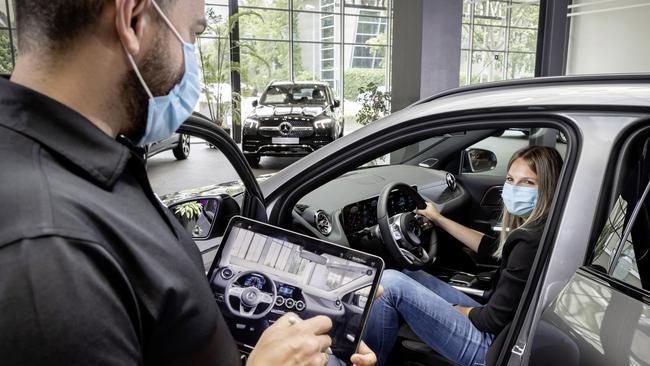COVID-19 accelerates Mercedes-Benz’s online shopping strategy
The Covid pandemic has forced the luxury German carmaker into a dramatic rethink, as dealership visits plummet.

Mercedes-Benz says the COVID pandemic has accelerated its shift to selling cars online, with the luxury German marque set to make internet shopping available across its entire range in Australia within the next two years.
Britta Seeger, who is on the board of management of Daimler and Mercedes-Benz and is responsible for marketing and sales, said the shift was part of the company’s “best customer experience 4.0” program.
Mercedes has already made its first all-electric car, the EQC, available online in Australia and has confirmed the rest of its vehicles will be available on its website from 2022.
Ms Seeger said the average number of dealership visits before buying a new car had plummeted from about eight to two in recent years, with many customers researching vehicles online beforehand.
It comes as online shopping has surged in Australia during the COVID-19 pandemic. Deloitte Access Economics estimates that Australia Post’s parcel deliveries alone injected an extra $2.4bn into the country’s e-commerce market in the three months to May.
“Customers today want to interact with their favourite brands whether online or in person, wherever, whenever. Moreover, for many of our customers luxury means comfort and, sometimes even more important, saving time,” Ms Seeger said.
“We expect that by 2025, 25 per cent of our worldwide passenger car sales will be made through online channels, together with our partners. COVID-19, what we have seen around the globe, has only accelerated this trend.”
Mercedes will adopt an agency model for its online sales, similar to another up-market German brand, Miele, which still relies on physical stores but uses set pricing and arranges delivery to customers.
Ms Seeger said dealers — who buy their stock directly from Mercedes — would still be important under the agency model, despite the company handling vehicle sales and distribution via its website.
“We absolutely see the human touch will always be an essential part of our business.”
Some luxury car brands experienced a sales bonanza in June after struggling through the first months of the pandemic, with Mercedes sales increasing 31.4 per cent, Audi 84.6 per cent and Lexus 60.8 per cent compared with the same month in 2019.
Australians opened their wallets again after delaying purchases during lockdown in March and April and also rushed to take advantage of the federal government’s extension of the instant asset write-off to $150,000 before the end of the financial year. Some customers also invested in a new car, using money that would have normally been spent on overseas holidays.
Ms Seeger said the agency model would eliminate haggling, a typical practice when buying any car, which can either be spirited or stressful depending on a customer’s negotiating skills.
“We need to carefully listen to our customers and what we learned is our customers at first really do appreciate and enjoy price equality for our models, and they do not have to worry about negotiating.
“The pricing is transparent and we provide it uniformly across all the channels. So this concept has been received very well from our customers.”
Mercedes has already introduced online sales in Germany and Ms Seeger said it experienced a 17 per cent uptick in daily traffic on its website between April and June.
She said online was crucial in maintaining contact with Mercedes during the pandemic.
“Via our digital dealerships we were able to maintain the contact with our customers, even though our physical locations to dealers around the globe had to be closed down.”
Mercedes’s online offering is also highly advanced in China, the home of the world’s biggest internet retailer Alibaba and Ms Seeger said the Chinese had been “very creative” in regard to e-commerce.
For the past five years, Mercedes’s Chinese customers have been able to buy cars online via Alibaba’s Tmall website.
“In China we offer our customers new car ordering experience online, including the online consultation and the car reservation. This has enabled contact-free opportunities for our customers to order their desired Mercedes-Benz.
“With the opening of the Mercedes-Benz Tmall flagship store in 2015 our customers have been able to schedule test drives and order genuine Mercedes-Benz parts or some other after sales services online.”
A Mercedes-Benz Australia spokesman said the online agency sales model for the EQC had been successful and the company is expecting to double the number of EQ agents in “the near future”.
“This comes in response to strong interest from customers in the vehicle, and numerous requests from the other retailers, and has been supported by an increase of EQC allocation for the Australian market,” the spokesman said.
“Mercedes-Benz Australia is working closely with the Mercedes-Benz retail network to develop a plan that ensures we continue to deliver the best customer experience and address customers’ present and future expectations.”






To join the conversation, please log in. Don't have an account? Register
Join the conversation, you are commenting as Logout